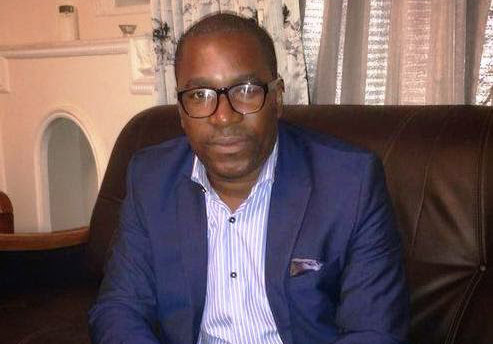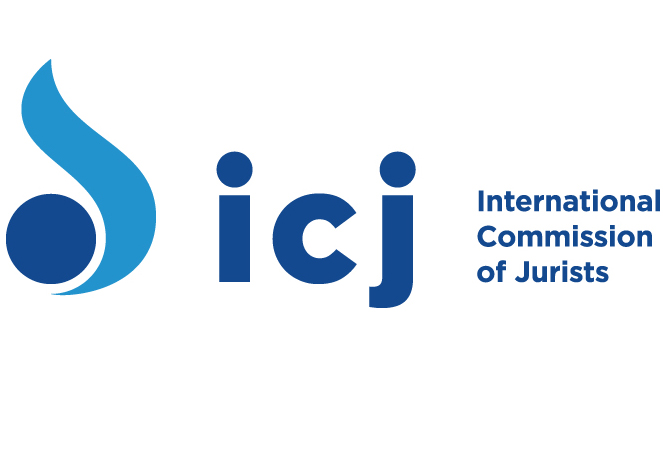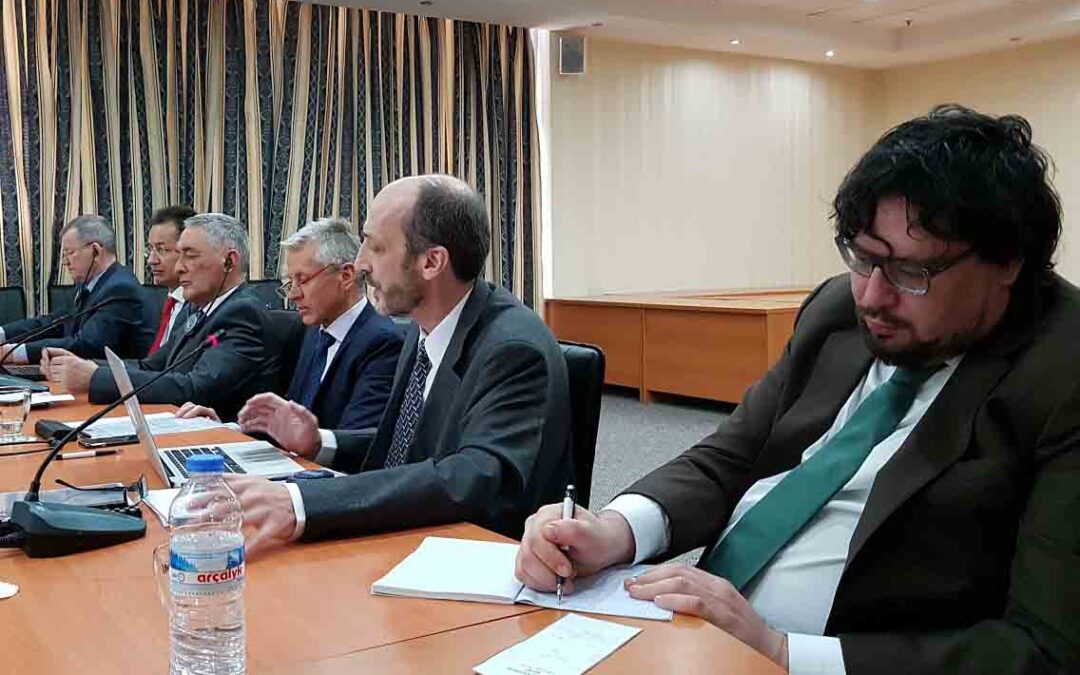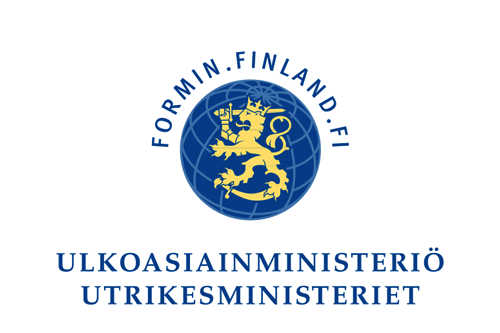
Feb 9, 2017 | News
The ICJ today condemned the arbitrary arrests and incommunicado detention of lawyer Felix Agbor-Balla and Dr. Fontem Aforteka’a Neba. They have been charged with a number of offences involving terrorism; rebellion against the State; incitement of civil unrest and breach of the Constitution.
Felix Agbor-Balla (photo) and Fontem Aforteka’a Neba, respectively President and Secretary General of the Cameroon Anglophone Civil Society Consortium (CACSC), were arrested on 17 January 2017, after the Minister of Territorial Administration banned all activities, meetings and demonstrations of the CACSC and the Southern Cameroon National Council (SCNC).
Since late October 2016, Cameroon has faced a number of demonstrations in several cities in the English-speaking regions of the country.
The protesters have been calling for an end of the use of the French language in courts and schools, among other demands, and the government has accused the two organizations, CACSC and SCNC, of supporting these activities.
The protests began after an indefinite strike by school teachers in the city of Bamenda, by youth protesting against alleged neglect of the Anglophone regions of Cameroon.
Felix Agbor-Balla and Fontem Aforteka’a Neba are currently detained incommunicado at the Yaounde Central Prison in Kondegui, which is far from where family members live. Their trial which had been set for 1 February 2017 was postponed without notice or due cause to 13 February 2017.
The charges they face require evidence establishing that they incited or carried out acts of violence or, that they were the instigators of the protests and demonstrations.
The two were arrested on the same day where they had signed a statement calling for protest activities to be carried out without violence.
If convicted of the charges, the two may face the death penalty.
The ICJ is concerned that the two men are being held incommunicado, in contravention of international standards, where they are vulnerable to ill-treatment.
The ICJ is also concerned at allegations that their charges stem from exercise of their internationally protected human rights, including rights to freedom of expression, association and assembly.
“Detaining the two incommunicado and prolonged detention without access to a judge violates their right to liberty and to a fair trial, which is protected under both international law and the law of Cameroon,” said Arnold Tsunga ICJ Africa Director.
The ICJ considers that Felix Agbor-Balla and Dr. Fontem Aforteka’a Neba should be immediately released.
If there should be reliable and admissible evidence to charge them with a cognizable crime for conduct not protected under human rights law, they should be immediately brought before a judicial authority to determine whether there is a lawful basis for trial and to determine whether they may be released.
In any event they should be removed from incommunicado detention and be granted full access to a lawyer, doctor if necessary, and family members.
Under no circumstances should they be subjected to the possibility of the death penalty.
ICJ further calls on the authorities in Cameroon to comply with their obligations under the treaties to which it is party, including as the African Charter on Human and People’s Rights, International Covenant on Civil and Political Rights.
These treaties guarantee the rights to a fair trial, liberty and freedom of expression, association and assembly, among other rights.
The ICJ opposes the use of the death penalty in all circumstances, as a violation the right to life and freedom from cruel, inhuman or degrading punishment.
The ICJ calls on Cameroon to impose a moratorium on the death penalty, with a view to abolition, in line with repeated calls by the UN General Assembly.
Contact
Arnold Tsunga, ICJ Regional Director for Africa, t: +27 716405926 or +263 777 283 249: e: arnold.tsunga(a)icj.org
Mary Pais Da Silva, Associate Legal Adviser, t: +268 7603 0078, e: mary.paisdasilva(a)icj.org

Feb 9, 2017 | Advocacy, News
The ICJ today welcomed the indefinite suspension of the hearings on the death penalty bills by the Philippine Senate’s Committee on Justice and Human Rights.
The Committee’s Chairman, Senator Richard Gordon, indicated the suspension was needed until the Department of Justice is able to submit its opinion on the Philippines’ obligations under the Second Optional Protocol to the International Covenant on Civil and Political Rights (ICCPR).
That instrument requires the Philippines to maintain its abolition.
“Abolitionist States may not return to the use of the death penalty generally under the ICCPR, and States that become party to the Second Optional Protocol assume very specific obligations to that effect,” said Emerlynne Gil, ICJ’s Senior International Legal Adviser for Southeast Asia. “There really is no inconsistency between the Second Optional Protocol and the Philippine Constitution.”
“As a general rule, the Philippine Constitution prohibits the death penalty except for compelling reasons involving heinous crimes. But in no way does it mandate that the death penalty be put into effect,” she added.
By ratifying the Second Optional Protocol, the Philippines has voluntarily chosen to be bound by an international obligation not to impose the death penalty – which it might otherwise have had the option to do under the Constitution.
As the ICJ explains in a memorandum on this issue, this is the very essence of treaty making.
“To announce long after ratification that a treaty is inconsistent with the Constitution and so not to be treated as binding, would call into question virtually every treaty to which Philippines is a party,” Gil said.
“This would contradict the most basic foundations of the international legal system and would lead other countries to view the Philippines as virtually incapable of making a reliable international legal agreement,” she added.
The ICJ emphasized that if the Philippines brings back the death penalty into its domestic laws, it would also be in violation of its obligations under the ICCPR, which effectively prohibits States from bringing back the death penalty once it has been abolished in domestic laws.
The Philippines cannot withdraw from Second Optional Protocol, which has no denunciation or withdrawal clause, the ICJ says.
The UN Human Rights Committee has explained that a denunciation clause was deliberately omitted because once the people are accorded the protection of the rights under the Second Optional Protocol, they shall not be deprived of such protection.
Background
On 7 February 2017, the Senate Committee on Justice and Human Rights held its first hearing on the proposed measure reintroducing the death penalty for illegal drugs and other crimes.
A similar bill to restore the death penalty is also currently being debated in plenary at the House of Representatives.
At the Senate hearing, senators opposing the proposed measure recalled that the Philippines is a State Party to the Second Optional Protocol, and thus, it is obliged not to execute any person within its jurisdiction.
Senator Richard Gordon, who chairs the Committee, thereafter, called for the indefinite suspension of the hearings on this matter until there could be clarity on the ramifications on the Philippines if it breaches its obligations under the Second Optional Protocol.
Contact
Emerlynne Gil, ICJ’s Senior International Legal Adviser, t +66 840923575 ; e: emerlynne.gil(a)icj.org
Philippines-Memo OP2 and Const-Advocacy-2017-ENG (Memo in English, PDF)

Feb 7, 2017 | News
Cambodian authorities should immediately drop the politically motivated criminal investigation of human rights defenders Am Sam-at and Chan Puthisak, the ICJ, Amnesty International and Human Rights Watch said today.
Cambodian officials have accused Sam-at, a respected human rights monitor at the Cambodian League for the Promotion and Defense of Human Rights (LICADHO) for nearly 20 years, and Puthisak, a land rights activist from Boeung Kak Lake and former prisoner of conscience, of instigating violence at a 10 October 2016 demonstration.
Para-police forces, who are regularly used to suppress demonstrations, violently dispersed what had been a peaceful protest in Phnom Penh.
When Puthisak attempted to prevent para-police from confiscating a drum that was being used by a demonstrator, four or five para-police attacked him, repeatedly beating him on the head with their fists, according to a video of the incident.
When Sam-at tried to stop the assault, the para-police attacked him, also beating him on the head. Both men sustained injuries that needed medical attention.
“The investigation of Sam-at and Puthisak by the Cambodian authorities is a typically absurd and undisguised case of judicial harassment,” said Champa Patel, Southeast Asia and Pacific Director at Amnesty International.
“As usual, unnecessary and excessive use of force by the para-police goes unpunished, and those who work to promote and protect human rights find themselves subject to criminal proceedings.”
On 4 November, two members of the para-police filed a complaint with the Phnom Penh Court of First Instance, alleging that they were injured during the dispersal of the demonstration.
The authorities are investigating Sam-at and Puthisak for instigating intentional violence, under Articles 27 and 217 of Cambodia’s Criminal Code, which carry penalties of up to three years in prison.
Both men are due for questioning on 8 February by Phnom Penh Court of First Instance Deputy Prosecutor Ngin Pich.
There has been no indication that complaints filed against para-police by Sam-at and Puthisak after the incident on 10 October 2016 are being investigated.
The 10 October demonstration involved approximately 150 participants peacefully calling for respect for housing and land rights in Freedom Park, an area designated for demonstrations.
The protestors were marching on a street adjacent to the park when the incident took place.
Videos of the incident establish that the demonstration was peaceful and that Sam-at was wearing a blue human rights monitor vest when the para-police attacked him.
The case investigation of the two falls within a wider pattern of judicial intimidation in Cambodia.
There are currently as many as 26 human rights and political activists in prison on charges which have all the hallmarks of being politically motivated.
This includes 14 political activists who were jailed following a demonstration in July 2014, when para-police violently clashed with participants.
No efforts have been reported of the authorities’ efforts to bring to justice the para-police responsible for the unlawful use of force.
“The case against Sam-at and Puthisak is part of an extensive effort by the Cambodian authorities to discredit the legitimate work of human rights organisations and to make clear the threat of prison for everyone working to promote and protect rights in the country,” said, Phil Robertson, Asia Deputy Director at Human Rights Watch.
“This campaign of intimidation against rights advocates has to stop now.”
Para-police, often referred to as “district security guards,” are auxiliary security forces that are regularly used to violently suppress demonstrations in Cambodia.
No single legal document sets out the rules governing their functions and powers. Rather, their legal basis and the rules governing their activities are set out in a confusing combination of government statements and policies, and by instructions from the Ministry of Interior.
They work in tandem with police, under the authority of district governors.
“The Cambodian government should be commending people like Sam-at and Puthisak for their work to promote and protect human rights rather than trying to intimidate them,” said Kingsley Abbott, Senior International Legal Advisor at the ICJ.
“The case should be immediately and formally closed and a genuine investigation initiated into wrongful use of force by the para-police.”

Feb 5, 2017 | E-bulletin on counter-terrorism & human rights, News
Read the 108th issue of ICJ’s monthly newsletter on proposed and actual changes in counter-terrorism laws, policies and practices and their impact on human rights at the national, regional and international levels. The E-Bulletin on Counter-Terrorism and Human...

Feb 2, 2017 | News
Today, the ICJ in cooperation with the the Supreme Court of Turkmenistan holds a seminar on Comparative Approaches to Judicial Ethics.
The seminar, supported by the European Union, will be attended by judges of the Supreme Court of Turkmenistan as well as other judges.
ICJ experts, including Judge Vladimir Borissov, former judge of the Supreme Court of Kazakhstan, Judge Georg Stawa, the President of the European Commission for the Efficiency of Justice (CEPEJ), and others will present comparative perspective and international standards related to the judicial ethics, accountability and guarantees for judges.
This is the second such event the ICJ holds in Turkmenistan. The first event, organized in June 2016, was dedicated to the issue of international obligations in national courts.
Turkmenistan-Judicial ethics seminar-News-web story-2017-RUS (full story in Russian, PDF)
Turkmenistan-Seminar Ethics-Agenda-2017-ENG (agenda in English, PDF)
Turkmenistan-Seminar Ethics-Agenda-2017-RUS (agenda in Russian, PDF)

Feb 1, 2017 | News
The ICJ today launched a new global initiative focussed on redress and accountability for gross human rights violations.
In all regions of the world, perpetrators of gross human rights violations enjoy impunity while victims, especially the most vulnerable and marginalized, remain without effective remedies and reparation.
Governments of countries in transition and/or experiencing a wider rule of law crisis often seek to provide impunity for perpetrators of gross violations of human rights, or make no effort to hold them to account, or misuse accountability mechanisms to provide arbitrary, politically partial justice.
Yet international law requires perpetrators to be held accountable and victims to be provided with effective remedies and reparation, including truth and guarantees of non-recurrence.
This is reinforced by the 2030 Sustainable Development Agenda, which recognizes the need to build peaceful, just and inclusive societies that provide equal access to justice, are based on the rule of law and respect for human rights, and provide for accountability.
“Impunity and lack of redress dehumanizes victims and acts as an impediment to the cementing of democratic values and the rule of law”, said Alex Conte, coordinator of the ICJ initiative.
Lack of accountability and claims for justice dominate national debates, frequently leading to a paralysis or reduced functioning of the institutions of the State and detracting from the pursuit of other rule of law and development initiatives.
Impunity threatens a nascent democracy by rendering its constitution hollow, weakening its judiciary and damaging the political credibility of its executive.
Public institutions often act in ways that bring them into disrepute and undermine the public confidence in them that is required for sustainable transition, for example through the legislature enacting laws providing for impunity, through law enforcement and the judiciary acting on a selective basis or without independence, and/or through the executive ignoring rule of law based judgments by higher courts.
A failure to guarantee redress and accountability has too often also resulted in former structures of power, to the extent that they enjoy impunity, transforming into criminal and hostile elements that may perpetuate violence and conflict.
The ICJ’s new initiative, generously sponsored by the Finnish Ministry of Foreign Affairs, currently focuses on seven countries (Cambodia, Mozambique, Myanmar, Nepal, Tajikistan, Tunisia and Venezuela) aims to combat impunity and promote redress for gross human rights violations.
It concentrates on the transformative role of the law, justice mechanisms and justice actors, seeking to achieve greater adherence of national legal and institutional frameworks with international law and standards so as to allow for effective redress and accountability; more independent justice mechanisms capable of dealing with challenges of impunity and access to redress; and judges, lawyers, human rights defenders, victims and their representatives that are better equipped to demand and deliver truth, justice and reparation.
The initiative will commence with the production of baseline studies on the situation in each focus country concerning accountability, access to justice/redress and the independence and accountability of judges and lawyers.
These will form the basis for tailored plans of action for each country identifying interventions and capacity building activities that can best drive the brining to justice of perpetrators of human rights violations and the access of victims to effective remedies and reparation.
Implementation of those activities will follow, alongside the production of global manuals and guides on key challenges for redress and accountability.
GRA Initiative Factsheet










